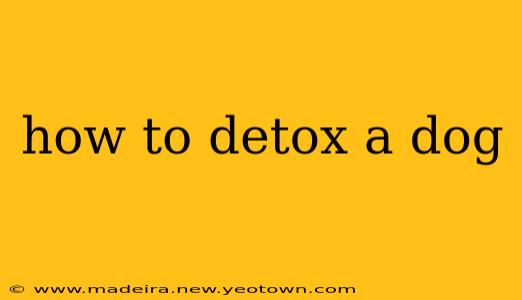How to Detox Your Dog: A Holistic Approach to Canine Wellness
Our canine companions are more than just pets; they're family. Their well-being is paramount, and sometimes, they need a little extra help to feel their best. Just like us, dogs can accumulate toxins from their environment, diet, and even medications. While a "detox" for dogs isn't the same as a human cleanse, supporting their body's natural detoxification processes can significantly benefit their health and vitality. This isn't about drastic measures, but rather a gentle, holistic approach to promote optimal canine wellness.
This journey started for me when my golden retriever, Gus, developed some persistent skin issues. After ruling out allergies and infections, my vet suggested looking at his overall health and considering ways to support his natural detoxification pathways. That’s when I dove into the world of canine wellness, and I’m here to share what I’ve learned.
What are the signs my dog needs a detox?
This is a crucial question, and unfortunately, there isn't one single telltale sign. However, some common indicators that your dog might benefit from support for detoxification include:
- Skin problems: Itchy, flaky skin, recurring hot spots, or dull coat can be symptoms of accumulated toxins. This was Gus's case, and improving his detoxification significantly improved his skin condition.
- Digestive issues: Chronic diarrhea, constipation, or gas can indicate the body struggling to eliminate waste properly.
- Lethargy and fatigue: If your usually energetic dog seems sluggish and tired, it could be a sign of toxin buildup.
- Behavioral changes: Sudden mood swings, anxiety, or irritability can sometimes be linked to an overwhelmed detoxification system.
- Bad breath: Persistent bad breath, especially after good dental hygiene, can be a sign of liver or digestive issues.
How do I naturally detox my dog?
A natural detox for your dog focuses on supporting the organs responsible for detoxification: the liver, kidneys, and intestines. This isn't about harsh cleanses, but rather gentle, supportive measures.
1. Prioritize High-Quality Nutrition: This forms the cornerstone of any canine wellness plan. A diet rich in whole foods, including lean proteins, fruits, and vegetables (always check for toxicity before introducing new foods!), can provide essential nutrients to support detoxification. Avoid processed foods, fillers, and artificial ingredients.
2. Boost Hydration: Adequate water intake is critical for flushing out toxins. Always ensure your dog has access to fresh, clean water.
3. Support Liver Health: The liver is the primary organ of detoxification. Adding liver-supporting supplements, such as milk thistle or dandelion root (under veterinary guidance!), can help optimize its function.
4. Promote Healthy Gut Flora: A healthy gut microbiome is essential for efficient digestion and elimination. Probiotics can help restore the balance of beneficial bacteria in the gut. Adding fermented foods (like plain yogurt – always check for xylitol, a dangerous artificial sweetener for dogs!) in moderation can also be beneficial.
5. Gentle Exercise: Regular physical activity helps stimulate the lymphatic system, which plays a vital role in eliminating waste products.
6. Regular Grooming: Brushing helps remove dead skin cells and dirt, which can contain toxins.
What supplements can I give my dog to help detox?
Important Note: Always consult with your veterinarian before introducing any supplements or making significant changes to your dog's diet. They can assess your dog's specific needs and recommend appropriate supplements and dosages. Never self-medicate your pet.
Some supplements commonly associated with supporting detoxification in dogs, when recommended by a vet, include milk thistle, dandelion root, and probiotics. Your vet can determine if these are suitable for your dog and guide you on safe and effective use.
Is activated charcoal good for detoxing my dog?
Activated charcoal has been used in some cases to help absorb toxins in dogs, but it's crucial to use it only under strict veterinary guidance. It can have potential side effects and interactions with other medications. Never administer activated charcoal without explicit veterinary instruction.
Can I use a commercial dog detox product?
Many commercial dog detox products are available, but it's crucial to carefully research and choose reputable brands with transparent ingredients and veterinary support. Always consult your veterinarian before using any commercial dog detox product.
My dog's skin is still bad even after trying these methods. What now?
If your dog's condition doesn't improve after trying these methods, schedule another appointment with your veterinarian. Persistent skin issues, or any other health concern that persists, could indicate an underlying medical condition that needs professional diagnosis and treatment.
Remember, a holistic approach to canine wellness is about gently supporting your dog's natural detoxification processes. By focusing on high-quality nutrition, hydration, and supportive supplements (under veterinary guidance), you can help your furry friend thrive. This journey, with Gus, has taught me the importance of partnership with your veterinarian and a gentle, holistic approach to canine health. The journey to wellness is a partnership, and your vet is your invaluable guide.

